Tasmania
Honest Government advertisement for today's election corrected to comply with the Tasmanian Electoral Act
 As votes are counted, the last remaining Liberal state government in Australia has won 13 out of the 35 seats in the Tasmanian government. The main opposition Labor Party has won 10 seats, the Greens have won 2 seats and 10 seats have yet to be decided.
As votes are counted, the last remaining Liberal state government in Australia has won 13 out of the 35 seats in the Tasmanian government. The main opposition Labor Party has won 10 seats, the Greens have won 2 seats and 10 seats have yet to be decided.
Escape from lock-down
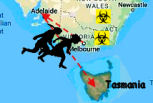 The girls needed a break. The university term had just finished and so had "lock-down". Students, Isla and her two housemates, Chloe and Emily, were anxious to escape Melbourne. Emily's friend Olivia who was studying at Adelaide University had been trying, for more than a year, to entice Emily over for a visit, and this seemed the opportunity. Of course all three girls would go over together and, as they all yearned for a seaside experience, after spending so much time in their rented inner suburban house, they booked into an apartment for five nights in Glenelg, not far from Emily. It would be great! They could go for walks along the beach every morning!
The girls needed a break. The university term had just finished and so had "lock-down". Students, Isla and her two housemates, Chloe and Emily, were anxious to escape Melbourne. Emily's friend Olivia who was studying at Adelaide University had been trying, for more than a year, to entice Emily over for a visit, and this seemed the opportunity. Of course all three girls would go over together and, as they all yearned for a seaside experience, after spending so much time in their rented inner suburban house, they booked into an apartment for five nights in Glenelg, not far from Emily. It would be great! They could go for walks along the beach every morning!
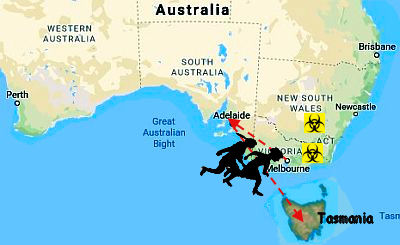
It was a very dull, cold, day when they left for Adelaide. They all felt both relaxed and excited. It had been a long term of study, and the first lock-down had been very stressful. University social life had been virtually non-existent since before Easter, with "social distancing", and then, for Isla, episodes of self-isolation, when travelling from Melbourne to her family in Hobart and back.
It was marvellous to get away and be on the open road! It felt almost as though normality was settling over the pandemic-stricken state. They stopped in Ballarat for a coffee, not sitting down in the cafe, as they would normally have done, but taking their drinks in disposable cups, each with a treat from the bakery, to a nearby park. Isla was in high spirits and, as the apricot filling of her danish pastry registered on her taste buds, she had an allover feeling that things would be OK.
They arrived in Adelaide the same day, just on sunset. Their GPS took them through the now lit up streets of Adelaide, to their accommodation in Glenelg. The accommodation was somewhat bizarre, in that it looked quite conventional as part of an old but well maintained brick house, but there was only one rather minimal sofa and low rafters in various inconvenient places, so they had to bend over to make their way from the living room to the kitchen and to their bedrooms. The establishment was run by an elderly couple who had a ten year old daughter. Unsolicited, the woman, who was probably in her mid sixties, gave them a long explanation of her in vitro fertilisation (IVF) treatment at an advanced age, resulting in a degree of fame and a much yearned-for daughter. She even showed them an ancient magazine featuring an article about this event! After such a long drive, the girls actually longed to unpack and relax, so were grateful when Samantha finally said good night, leaving six slices of bread for their morning toast.
That first evening, the girls took it in turns to lie on the sofa in front of the television, with legs dangling over the edge. The other two lay on the floor, on sleeping bags they had brought, in case they needed to sleep in the car. Such is the lottery of booking accomodation on the Internet!
The next morning they met Olivia, a third-year architecture student who, it was clear, had very much missed her former Bendigo school mate, Emily
In Adelaide it was possible to do far more than one could in Melbourne, where galleries, theatres, cinemas, and many restaurants, were closed, but in Adelaide there was some theatre and they took the opportunity of seeing The Book of Mormon as well as visiting wineries and galleries.
They had not been taking much notice of the news, as they were on holiday, and did not want the be continually brought back to reality. One day, though, their leisurely breakfast was interrupted by a knock on the door. It was Samantha, with her daughter Ellen by her side. Samantha was prone to histrionics and, in overly dramatic terms, conveyed to the girls that Melbourne was going into a second lock-down! The girls greeted this news almost with amusement, but Samantha was frantic. She was under the illusion that the girls had to return to Melbourne before it was locked down, or they would not be able to return at all! Isla reassured Samantha that they had the situation in hand and would still probably be leaving on the allocated day.
After Samantha and Ellen left, the girls started making plans. This lock-down did change things, but they knew they were not locked out of Melbourne. In fact, this was their opportunity to escape being locked in!
Did anyone want to return to Melbourne? Definitely not! Isla decided on the spot to return to Hobart and continue the next term of her course online, until Melbourne was unlocked. After all, she would be doing the course online, anyway, if she were in Melbourne. The year had been so disrupted, with cancelled placements and very few physical meetings with her fellow students and lecturers. She went online and booked a flight from Adelaide to Hobart, on the day they would have returned to Melbourne. Emily would return to Bendigo and Chloe would return to Shepparton. They had come over in Emily's car and Emily would drive Chloe home to Shepparton, before returning home.
They made the most of their last few days in Adelaide. On the day of their departure, Emily drove Isla to the airport, and then continued with Chloe back to Victoria. The parting at the airport was quite emotional, as none of them knew when they would return to the house that, together, they had called home all year.
Isla had a three hour wait for her flight, but once she was in the departure lounge, she relaxed with a course-related book she happened to have brought with her on important minerals in root vegetables. Her phone was charged so she was entertained. Two hours after takeoff, Isla was collecting her luggage from the carousel at Hobart Airport. Her sister, Bea, was waiting for her, and she was overcome with relief She had not realised how stressed she had been over the past few months, but now she was back to normality. It was was as though she had come from a different country!
They pulled into the driveway of their suburban Hobart home, overlooking the Derwent River. As one of her relatives once said, "You don't live in Hobart unless it's in a house with a view!" This had seemed a terribly privileged and amusing thing to say at the time, but now she appreciated the somewhat isolated privilege enjoyed by Tasmanians. She raced inside to be greeted enthusiastically by Terence the sheepdog. They both rolled on the carpet in delight at seeing one another. She and Bea debriefed for the rest of the afternoon until their mother, Kate came home from work.

The rules in Tasmania for a person returning from interstate were self-isolation for 2 weeks. Isla was resigned to this, and she did not really care, as she knew at the end of those two weeks, that she would be free. The Tasmanian Government had kept its population safe, and for this she was forever grateful.
When the two weeks were up, Isla stepped outside and headed towards the yacht club. Solitarily, she strolled along the beach. Never before had the water looked clearer, the sky such a pure blue, and the quiet of the morning enveloped her, at the same time seeming to give her space to expand her consciousness.
Epilogue:
This is Australia in 2020. The quality of life is different in each state and bad luck for you if you are in the wrong state. Isla was lucky to escape Victoria, as there are now few freedoms for its inhabitants, due to the Covid 19 virus raging through the state. Other states had all but eliminated the virus, but things went badly wrong in Victoria, and this has put other states in jeopardy. It will be a long time before the people of Victoria can actually fully occupy and enjoy their own state and their own country.
Shhhh! Don't talk about Hobart! - Article by Sally Pepper
 I'm developing an unreasonable sense of proprietorship over Australia's island state,Tasmania. One could call it a "Tasmania mania", I suppose. How did this seemingly irrational neurosis arise? Am I alone?
I'm developing an unreasonable sense of proprietorship over Australia's island state,Tasmania. One could call it a "Tasmania mania", I suppose. How did this seemingly irrational neurosis arise? Am I alone?
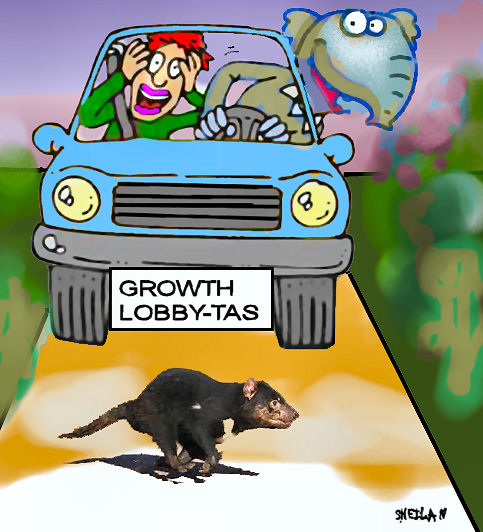
About 15 years ago I realised that Victoria, where I live, was doomed to never-ending development, due to government insistence that we have incessant population growth, heavily supplemented from overseas immigration. You would wonder how an ordinary citizen could actually notice that the population was growing. Surely the changes would be happening in places where the people have not yet settled and would be out of sight and out of mind? To an extent, this was true for a while, and you had to go to the outskirts of Melbourne to see the sea of new rooftops on the side of highways trying to hide behind high walls. Those living in the "growth corridors" would complain of the massive changes in their local areas. They would moan in agony at the farmland and treasured bush land they could see being sacrificed for yet more suburbs. They tried to make us hear about what was happening and we listened but 15 years ago our established suburbs remained intact and our lives were relatively undisturbed so we were complacent.
In more recent years, a heavy foot has trodden on the accelerator of population growth and development. There seemed to be a spark of recognition from governments that Melbourne needed to be contained in some manner. The established suburbs were told they had to take their share of the population growth load. In came the bulldozers and, at a faster and faster rate, we all noticed empty blocks in our streets, and we struggled the very next day, post demolition, to remember what had been there the day before. Some of the demolitions got publicity. The gracious Victorian or Edwardian large houses or mansions, giving way to the wrecking ball after unsuccessful but valiant struggles by locals to preserve heritage and amenity, were and continue to be soon just large cavities. All vegetation is invariably removed, except for perhaps a token tree if not in the way of the giant yet to be constructed. Noise and the disruption of continual roadworks and infrastructure upgrades are now part our lives in Melbourne's suburbs. We live with short term uncertainty but long term resignation that our home environment will continue to be heavily degraded.

I think of not only the residents who are being inconvenienced and disadvantaged, but of the suburban wildlife - especially birds who will all but disappear. Once a large garden is excavated and transformed into a basement car park, that land is no longer a home for underground insects or flowering plants or trees. Habitat, in other words, is wiped out in an instant. "Birds can go somewhere else," they say. Well they can do this if there is somewhere else to go, but that means nevertheless that they are gone from the area. You will no longer get to hear them or see them. That is a huge loss that impoverishes your soul and those of your children, possibly before you can even put it into words.
I used to derive some comfort from the actual possibility that I can always move to Tasmania. I have visited Tasmania since my childhood as my grandparents and many cousins, uncles and aunts lived there. My family had a whole summer life-style there every year and so it was in a sense a second home. As a child I appreciated its quietness and beauty. Its sense of history, Hobart having been settled earlier than Melbourne, was reflected in many of its buildings. Tasmania, in reality, is not my home though. I have never lived there and I don't own any property there. But over the last 20 years it has been in the back of my mind as a possibility, an escape-hatch, as Melbourne's population surges towards 10 million (the same population of the whole of Australia when I was in primary school.)
For these reasons I feel a sense of alarm when I hear Tasmania mentioned in the news or on television or radio programs. I feel anxious, on the alert. What are they going to do? What are they going to change? I used to delight in the fact that whenever I returned to Tasmania, even in my adult years, it was always more or less the same; low key.
Yesterday I found my Tasmanian grandfather's 100+ year old scrap book. It provides an insight into life on that island at the time, through my grandfather's youthful passion for long-distance running. There are photos, newspaper clippings, and athletes programs about the many races and carnivals of the Hobart Harrier Club. The brown pages of the album are also filled out with images of relaxed beach goers and reunions of the old competitors 40 years later.
One album does not describe a whole lifestyle, but I could not help forming the impression that life was full and that those young men a century ago had made a life for themselves which was both physically and socially rewarding. This was in a small city in a state where the entire population of was only about 180,000"
My mother grew up in Hobart of the 1920s and 1930s. At that time her parents, as did many people in Hobart, owned a beach shack on the other side of the Derwent River to the city. She told me that she and her friends would catch a ferry to O'Possum Bay to stay on weekends. On arrival they would drop their bags at the house and proceed to the beach. If they saw anyone else on their chosen beach, they would move away around a point to another beach.
In the 1950s and 60s people in Hobart still had their beach shacks. My older cousins enjoyed sports such as surfing, water skiing, and sailing. I'm sure they worked hard at their weekday jobs or at school, but what I saw, was an easy accessibility to pastimes that would to most now seem like a luxury.
One of my cousins told me a few years ago that he would never move to Melbourne, as the 'lifestyle' wouldn't suit him. I found this amusing, as it seemed to me that no-one would actually choose the lifestyle on offer in Melbourne!
I wonder if the 'lifestyle' will suit him if the population of Hobart grows as the current premier intends it to.
Having spent the in Tasmania more than half a century ago, and hearing tales of the life there yet another 50 years before that, I feel I know the place a bit. I also know Melbourne very well and have watched it change from a rather quiet city, where you could get out easily into the country on the weekend just for an afternoon and where, if you could drive to a place, you could be pretty sure of being able to park your car there. You could be spontaneous about going places. All that has gone. Now, as often as not, I will hatch a plan involving travel in or around Melbourne, and then abandon the idea because of the uncertainties of traffic and parking.
I would like to keep alive the escape-hatch dream of simply moving to Hobart when Melbourne reaches complete bursting point. My anxiety levels rise when I hear of Hobart's fast growing population or when anyone puts it on the map for any reason. I heard this morning that MONA (Museum of Old and New Art, Hobart) was to be expanded further, and I felt sad. I like MONA but to me it is not Hobart, and why does it have to be bigger? Part of its attraction is the setting and, if it expands, more of the setting will be lost.
I would prefer not hear any news coming from Hobart. I want it to be quiet and unobtrusive and to just wait for me in case I need it.
New Tasmanian laws may punish democratic protests to protect forests with jail sentences, huge fines
 The right to demand protection for Australia's iconic, irreplaceable environment is a liberty that must be preserved at all costs. But if the Tasmanian government has its way, soon environmental protesters could be punished with a mandatory minimum of three months in prison.
The right to demand protection for Australia's iconic, irreplaceable environment is a liberty that must be preserved at all costs. But if the Tasmanian government has its way, soon environmental protesters could be punished with a mandatory minimum of three months in prison.
It sounds like something out of a fantasy novel, but it's true: Tasmania's Lower House has passed a law that could see three-month minimum prison sentences imposed on environmental protesters. The new laws would also include fines for those who incite and encourage protests.
 The laws will impose a $2,000 fine for someone who is found "invading or hindering" a business. However, the penalty will increase to $5,000 if it goes to court with a subsequent guilty verdict. And a second offence will see protesters jailed for a mandatory three-month term, with a potential two-year maximum.
The laws will impose a $2,000 fine for someone who is found "invading or hindering" a business. However, the penalty will increase to $5,000 if it goes to court with a subsequent guilty verdict. And a second offence will see protesters jailed for a mandatory three-month term, with a potential two-year maximum.
Activists fear that the law will mainly be used to target those trying to rescue Tasmania's ancient forests, many of which are in peril of being destroyed by major lumber companies.
Australians should be able to nonviolently stand up to save their homes without fear of being thrown in jail. Tell Tasmania's Upper House to reject the law and protect every citizen's right to protest!
Original source of article was the "Care2" petition site. Whilst petitions tend to be ignored by our governments, which ignore our will most of the time, this is a way to publicise what is happening. We need to keep bringing these examples of the growing legal repression in our society to the public and to try to organise to combat this road to devastation and a prison planet. Environmental and democracy activists should also consider educating themselves about alternatives to the current financial system for funding protests and bringing people together, such as crowd funding and bitcoin. The Australian system of land-tenure and population settlement severely disorganises ordinary people but there is some hope that they can reorganise outside the traditional financial system. See http://candobetter.net/?q=node/3919 and and on 'crowdfunding".
Kathryn Fox's new novel all about GM and Chinese buying up Tasmania
 Australian medical novelist, Kathryn Fox's writing shows more interest in the lives of victims of crime than in the gruesome details of their deaths. Her obvious social conscience and real sensitivity makes other forensic crime writers, like Patricia Cornwell and Kathy Reichs, look like teen-age necrophiliacs.
Australian medical novelist, Kathryn Fox's writing shows more interest in the lives of victims of crime than in the gruesome details of their deaths. Her obvious social conscience and real sensitivity makes other forensic crime writers, like Patricia Cornwell and Kathy Reichs, look like teen-age necrophiliacs.
Kathryn Fox is different. One is educated about society in her novels. Her most recent novel,
Fatal Impact set in Tasmania, an island which is the southernmost point of Australia, has developed beyond the social, into the political.
 With ongoing news of the growth lobby's entrenchment in Tasmania, I was sensitized to the major topic, which was the Chinese takeover of agricultural land in Tasmania, aided and abetted by Australian politicians and property dealers. (Is there any difference?) Fox even cites the problems in Australia's Foreign Mergers and Acquisitions Law.
With ongoing news of the growth lobby's entrenchment in Tasmania, I was sensitized to the major topic, which was the Chinese takeover of agricultural land in Tasmania, aided and abetted by Australian politicians and property dealers. (Is there any difference?) Fox even cites the problems in Australia's Foreign Mergers and Acquisitions Law.
Australians know and are worried about the selling off agricultural land on the mainland and in Tasmania, but only the organisations that lead the growth lobby, such as the Property Council of Australia and the State government executives can be aware of the design and extent of this dispossession and our disempowerment.
Kathryn Fox's characters find out more than you and I can, and you have to wonder whether this doctor-author, who has real-live experience in criminal investigations, knows more than most of us about the selling off of Australia. If she does, she is doing Tasmanians and other Australians a favour in outing the intrinsic sociopathy of the politicians who are selling off Australia piece by piece in a covertly planned and publicly defiant operation that goes right up to the office of prime minister and beyond, since it is international. See "Bad Australian Foreign Investment Laws marginalise Australians", National Foreign Investment Review Board (NFIRB) and "Foreign ownership".
The book also integrates information from recent reports on European studies of the longer-than-3 months effects of genetic Engineering and applies them to its human characters. The actual reports her fictitious ones seem to be based on were about Monsanto and Roundup and led to the complete banning of genetic engineering of farm crops in France and other parts of continental Europe. See "France: Rats fed GM foods for two years massive increase in tumours and death." In 2012, this ban was reversed by the European Union which can override French law. The scientist whose study drew attention to Roundup has suffered predictably for his courage and you can read more in this article: "150 Global Scientists Condemn Retraction of Seralini GM Maize Study".
In fact, the problems we are actually looking at with loss of self-government to foreign occupation, and with mainstream media too invested in food and drugs to report on the problems of genetic engineering and other aspects of totally industrialised food chains, are so awful and involve such powerful forces that it seems that the only way they can be pursued safely is via a novel.
I commend Kathryn Fox for developing the forensic pathology novel into a forensic political pathology novel and for attempting to educate Australians who might otherwise not be aware of some major issues affecting this country.
I also highly recommend all her novels, mostly set in Australia.
NOTES
The Foreign Investment Review Board (of Australia) www.firb.gov.au
"The Government also recognises community concerns about foreign ownership of certain Australian assets. The review system allows the Government to consider these concerns when assessing Australia’s national interest.
The national interest test also recognises the importance of Australia’s market-based system, where companies are responsive to shareholders and where investment and sales decisions are driven by market forces rather than external strategic or non-commercial considerations." Source: Australia's Foreign Investment Policy (2013) http://www.firb.gov.au/content/policy.asp?NavID=1
"Foreign Investment Review Board Annual Report 2012-2013"
Main points
In 2012?13, 12,731 proposals received foreign investment approval; compared with 10,703 in 2011?12 (the sectoral breakdown below excludes 84 reorganisations).
The real estate sector recorded 12,025 approvals, compared with 10,118 approvals in 2011?12.
Other sectors also had an increase in approvals with 622 approvals in 2012?13, compared with 504 approvals in 2011?12.
Approvals in 2012?13 were given for $135.7 billion of proposed investment. This represented a 20.5 per cent decrease on the $170.7 billion in proposed investment approved in 2011?12.
In real estate, approved proposed investment was $51.9 billion in 2012?13, compared with $59.1 billion in 2011?12. Proposed investment in commercial real estate decreased, from $39.4 billion in 2011?12 to $34.8 billion in 2012?13. Proposed investment in residential real estate also decreased, from $19.7 billion in 2011?12 to $17.2 billion in 2012?13.
In other sectors, approved proposed investment in 2012?13 was $83.8 billion, a decrease of 24.9 per cent compared with the $111.6 billion approved in 2011?12.
In 2012?13, no proposals were rejected (compared with 13 real estate related proposals rejected in 2011?12).
The real estate sector was the largest destination by value, with approvals in 2012?13 of $51.9 billion. In 2012?13, the other major sectors were: mineral exploration and development, with approved proposed investment of $45.1 billion; and services (excluding tourism), with approved proposed investment of $25.9 billion.
The United States ($20.6 billion) was again the largest source country for approved proposed investment in 2012?13. Other major source countries of approved proposed investment in 2012?13 were Switzerland ($18.4 billion), China ($15.8 billion), Canada ($14.4 billion) and the United Kingdom ($6.8 billion).
Fox Invasion threatens wave of extinction in Tasmania
 For over 200 years Tasmanian wildlife were spared the devastating presence of foxes. A few years ago foxes made it onto the island. Now the effort to stop the irreversible spread of foxes in Tasmania is at a critical stage with many native species at risk of extinction, according to research in the British Ecological Society’s Journal of Applied Ecology.
For over 200 years Tasmanian wildlife were spared the devastating presence of foxes. A few years ago foxes made it onto the island. Now the effort to stop the irreversible spread of foxes in Tasmania is at a critical stage with many native species at risk of extinction, according to research in the British Ecological Society’s Journal of Applied Ecology.
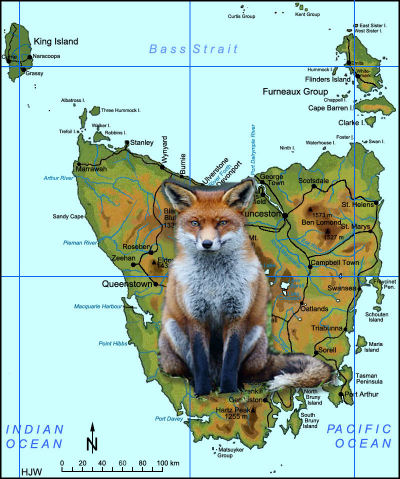
Using DNA detection techniques, University of Canberra ecologists and collaborators mapped the presence of foxes in Tasmania, predicted their spread and developed a model of their likely distribution as a blueprint for fox eradication. The results suggested that swift and decisive action is needed.
Team leader, Stephen Sarre, University of Canberra professor in wildlife genetics, found that foxes are widespread in northern and eastern Tasmania and the model developed by his team forecasts they will spread even further with likely devastating consequences for the island’s wildlife.
‘If we allow them to establish themselves we could see a catastrophic wave of extinction across the island,’ Professor Sarre said.
‘This research shows foxes are on the verge of becoming irreversibly present in Tasmania,’ he said. ‘Their apparent widespread distribution indicates that the eradication effort is at a critical point and that there is no time to lose.’
Professor Sarre and colleagues used forensic DNA tests combined with collections of fox scats to detect and map the distribution of the predator in Tasmania.
Their detective work, in partnership with Tasmania’s Fox Eradication Program, represents one of the largest surveys of its kind worldwide and provides the first systematic examination of the distribution of foxes in the island, following evidence and allegations that indicate a long history of isolated introductions.
According to Professor Sarre, the widespread nature of the predator distribution in Tasmania reveals that targeting only fox activity hotspots for eradication is unlikely to be successful.
‘The recently adopted plan of baiting all highly suitable fox habitats is the right one given the widespread fox distribution that we’ve found.
The Eastern Barred Bandicoot (Perameles gunnii) in Tasmania is one of the species at risk from the spread of foxes in the island state.
Credit: JJ Harrison under Creative Commons CC BY-SA 3.0 licence
‘The present situation could be as serious a threat to the pristine Tasmanian environment as the previous extinction wave was to Australia’s mainland fauna, following the arrival of Europeans and which has so far wiped out more than 20 species.
‘We suggest an increased effort and an even more focused approach to maximise the chances of a successful eradication. Otherwise, Australia stands on the precipice of another major episode of mammalian extinctions.’
The organisations involved in the research include the University of Canberra, Arthur Rylah Institute, NSW Department of Primary Industry, and Tasmanian Department of Primary Industry Parks Water and the Environment collaborating, with and partially funded by, the Invasive Animals CRC.
Source: University of Canberra
The Tarkine Wilderness under threat
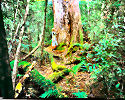 Tasmania's Tarkine rainforests are important for their flora which has links to the ancient continent of Gondwana, and for their lichens and fossils which help tell the story of Australia's ancient flora and its evolution.
Tasmania's Tarkine rainforests are important for their flora which has links to the ancient continent of Gondwana, and for their lichens and fossils which help tell the story of Australia's ancient flora and its evolution.
Mining companies like Venture Minerals are desperate to exploit the minerals beneath Tasmania's environmentally significant Tarkine area. Demand for metals being placed above the value of the environment.
The Tarkine region is located in the north-west of Tasmania. The area encompasses 447,000 hectares of wilderness including the Southern Hemispheres largest single tract of temperate rain forest, a wild coastline with an extraordinary wealth of Aboriginal Cultural Heritage sites. It's the habitat for over 50 threatened species.
The extensive rainforests, beautiful river gorges, buttongrass mountain tops, flowering heathlands and long wild beaches combine to make the Tarkine one of the world's great treasures.
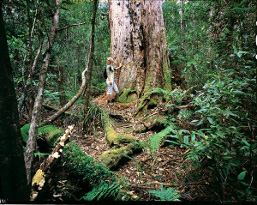
These rainforests are important for their flora which has links to the ancient continent of Gondwana, and for their lichens and fossils which help tell the story of Australia's ancient flora and its evolution.
The Tarkine is a sensitive region rich in mega-diversity. It's one of the world's last remaining temperate rain-forests, the home of the Tasmanian Devil and many other precious species.
National Heritage a must:
The Tarkine must be put on the National Heritage List. The heritage assessment of The Tarkine will help ensure that the heritage values are considered in decision-making, so heritage protection is balanced with the social and economic aspirations of the Tasmanian community. Short-term economic benefits should not be at the expense of the un-quantifiable value of ancient woodlands, rugged coastlines, and forest habitat destruction.
Mining companies like Venture Minerals are desperate to exploit the minerals beneath Tasmania's environmentally significant Tarkine area.
Demand for metals being placed above the environment:
Chinese demand for base metals such as gold, iron, tin, zinc, lead, copper is at an all time high, and this would mean logging, pollution, roads, and heavy traffic destroying the landscape and pristine rivers.
Environment Minister Tony Burke was called on to immediately include the Tarkine on the emergency National Heritage Listing amid concerns about the impact on the Tasmanian devil population of a revised tourist road project. He denied that he made a promise to do so. His predecessor, Peter Garrett, first gave the Tarkine wilderness a one-year emergency listing, which Mr Burke let expire. Since then he has let a British mining company test drill in the area.
Mr Burke says the new plan for a tourist road is not the same as the original 132-kilometre loop road plan that was subject to a now lapsed emergency listing. One road is not similarly destructive an another?
Mining and road proposals threaten to carve up Tasmania's unprotected the Tarkine wilderness area, local defenders say.
Venture Mineral's Mt Lindsay tin, tungsten and iron mining proposal, coupled with the revival of the controversial Tarkine link road proposal, should have given Mr Burke grounds to reinstate Tarkine's emergency National Heritage listing. Heritage listings would not stop mining, but developments would have to pass more rigorous and critical environmental tests.
The Mount Lindsay tin project is the largest of several mines planned around the Tarkine in an emerging new Tasmanian environmental battle. The Tarkine National Coalition said up to nine new open cut mines are in development there. Venture Minerals predict $1 billion in revenue, with more than 500 jobs in construction and 200 in operation.
Surely the threats of mining are enough reasons for an emergency heritage listing for the Tarkine?
Mr Burke says the principle that a heritage listing automatically locks out all development is wrong. He says with or without a heritage listing, environmental protection remains. "Developments" and "protection" are inherently contradictory.
Mr Jordan who heads the Tarkine National Coalition says Mr Burke's decision to lift the heritage listing means other mining companies will not be scrutinised as closely as Beacon Hill Resources. The whole area should be protected as a national park.
The interests of miners are being placed above the Minister's obligations to the environment. All three proposed mining projects will have secured Commonwealth environmental permits during the 18 month period he had at his disposal, allowing them to avoid scrutiny against National Heritage criteria. They will also be allowed to continue exploration drilling and associated access roading without need for Commonwealth assessments.
The mining will cause havoc to the pristine condition of the area. There is nothing "sustainable" now. It's just window-dressing. What about the costs and long term damage of these industries and jobs? Mr Burke is supposed to represent the environment, not the mining industries. As with his population strategy, that come to nothing, he is now abrogating his duty to protect one of the last temperate rain-forest areas in the world.
It is wrong to destroy sacred and holy places to plunder their riches, and the same applies to Nature's sacred places.
Getup - Save the Tarkine
Please email Minister Burke [email protected]
Jill Redwood on Successful industry-environmentalist forest agreement in Tasmania
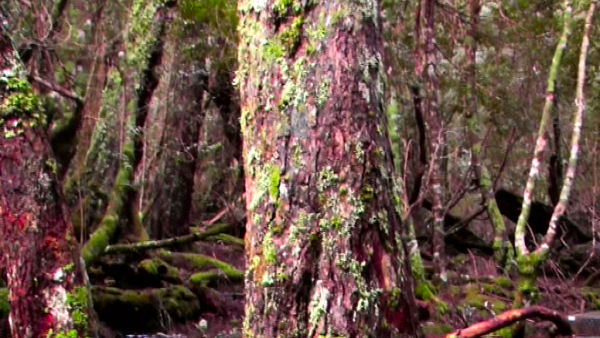
Article by Jill Redwood, in response to the historic agreement which has reportedly been reached to save Tasmania's wild forests. The intention is to move loggers from the old forests into the plantation industry. The Age reported that "Parties to the talks, who all strenuously rejected the involvement of politicians in the negotiations, refused to comment before today's announcement." International markets for woodchips have been down for some time. Victorians might wonder, is the Tasmanian Green movement different from - and more really green - than the one identified with the Victorian "Green Brand" party? (See discussion below "Are the Greens a real alternative?".) Consider also that Environmentalist movements exist outside political parties and that we do not need political parties to make a difference if those parties do not serve us well. The following article is sourced from Jill Redwood. This 'teaser' is from candobetter.org Photos by Sheila Newman
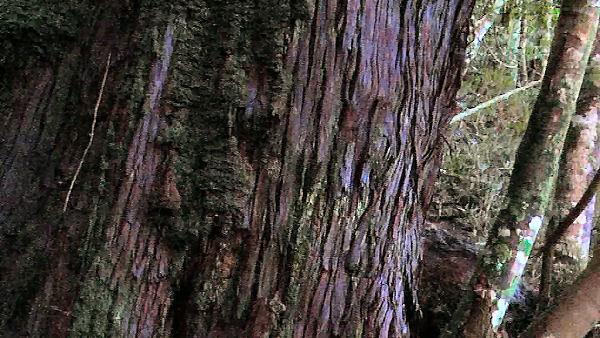
Dot points on Tuesday 19th October 2010 Tasmania agreement announcement and implications for Victoria and beyond
(thanks to Luke for some of these figures).
· Gunns has seen the light and is moving into plantations only.
· Very courageous move by industry to get together with green groups and come to an agreement that helps everyone.
· Victorian industry can also follow suit – govt should help these negotiations along.
· Needed now more than ever – native forests logging is on down-hill run as:
o plantation products dominate the timber market,
o high Aussie dollar (and Asia still recovering from GFC) means export woodchip industry in steep decline,
o resource running out – forcing govt to move loggers into highly contentious areas = provoking conflict.
o Gunns – large company, has seen the future is not in native forests.
· Industry also agreed not to use native forest wood “waste” to burn for electricity – a major win.
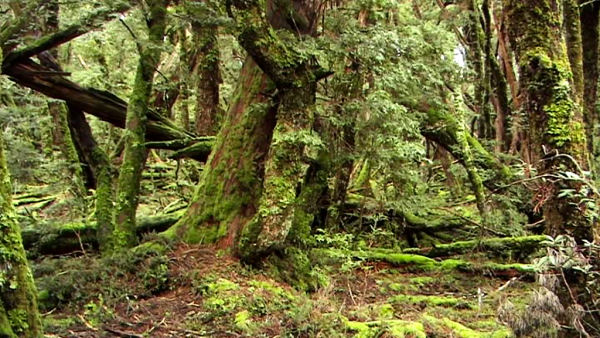
Plantation option in Victoria is real.
· Plantations can meet 98% of our timber and woodchip/paper markets right now – meaning there is no excuse to continue clearfelling and industrial scale logging in native forests.
· Many new building products like compressed wood board and engineered lumber (flooring/craft wood/paneling/LVL etc) don’t require large diameter trees. General framing timber (scantling) is easily supplied by pine plantations. The small amount of feature grade hardwood timber that can’t yet be supplied by plantations (such as for high grade hardwood flooring and high quality panelling) can be provided by alternate and engineered wood products, recycled hardwood or carefully selected trees from native forests (but not clearfell logging).
· The logging industry is in terminal decline in East Gippsland with employment being less than 1% of the region’s total workforce. The rest of Eastern Victoria is similar – and even Maryvale paper mill is 80% plantation based. Not difficult to get them out of Central Highland’s forests.
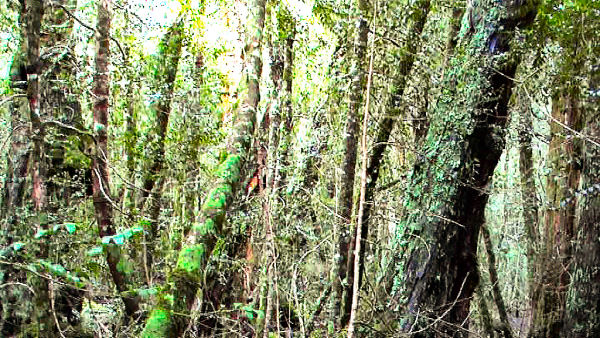
To ensure secure employment, the industry needs to:
1. Retool their mills to process plantation wood (from Tumut NSW, Sth Gippy or NE plantations).
2. Receive govt assistance to relocate workers and families to the plantation areas of Western Vic. where the plantation companies are actually importing workers from overseas to fill the employment gaps in logging.
3. Take exit packages and be assisted into other areas of employment.
In Victoria we take 1.9 million tones of native forest wood out every year. Of that, 1.5 million tones is pulplogs – all of which is 100% substitutable with plantation wood.
Of the other 400,000 tonnes that are sawlog trees, the are used for pallets, roof battens, fence palings, crossbars on power poles, subfloor bearers - all are easily substitutable by plantation wood and other products.
The 1-2% used for high quality appearance grade furniture, paneling etc could still be taken from native forests if very carefully selected and used. Clearfelling thousands ha is now unnecessary (never was needed until woodchipping dominated).
1986 – NIEIR reported on the projected impacts on the new parks in East Gippy (LCC recommendations). They calculated that unless govt altered their policies there was no future for the industry. They recommended reduction in the take of logs from around 360,000m3 a year of sawlogs (not counting woodchip logs) to 70,000 m3 to ensure sustainability. But government and industry continued cutting at 280,000 through all 1990s and 110,000m3 average in the 2000s).
(In 2002-03 - 191,000m3 sawlogs, in 2003-04 - 135,000m3, 2004-05 – 122,000m3, 2005-06 - 106,000m3, 2006-07 - 91,000m3, 2007-08 - 99,000m3 sawlogs. Plus about 350,000m3 of pulplogs as well. Clearly overcutting – ‘cut-out and get-out’ mentality has ruled the industry and govt)
85% of trees taken from native forests ends up as woodchips. Criminal.
Small 2% of high grade timber can be taken from selectively logged trees off public land while hardwood plantations are established (20-25 years). Some hardwood plantations for pulp could already be used for this if managed for sawlogs and milled in a particular way.
Western Vic plantations is where it’s mostly at – ABARE figures show that up until 2007-08 – only getting 0.5million tonnes m3 of plantation hardwood chips – but this year these plantations are supplying 4 million tonnes! The wall of wood has hit us from plantings in the 80s and 90s.
Western Vic plantations companies (Gunns, Australian Blue Gum Plantations and ITC) are importing jobs from OS to log the plantations! Plenty of scope for helping relocate Eastern Vic logging workers into secure jobs there.
Jill Redwood
Coordinator
Environment East Gippsland Inc
(6800 Bonang Rd Goongerah)
Locked Bag 3
ORBOST Vic 3888
Ph (03) 5154 0145
www.eastgippsland.net.au
Input to Tasmanian Wildlife Regulations Review closes 13 August 2010
Tasmanian wildlife are in a terrible situation and there is a great need for better laws to look after their welfare and habitat. Candobetter did articles on this problem Tasmania, West Australia, Victoria - our wildlife are ignored by government, and fortunately the recent Auditor General Special Report No. 78, Management of threatened species (Tasmania) will hopefully provide a good basis for your submissions. Please send your submissions to us and we will publish them.
The closing date for submissions is Friday 13 August 2010.
Tasmania: Native Plants & Animals, Changes to laws
Department of Primary Industries, Parks, Water and Environment, Native Plants & Animals, Wildlife Regulations Review
Wildlife Regulations Review
Public submissions invited by 13 August 2010.
The following extracts are taken from the Government site at http://www.dpiw.tas.gov.au/inter.nsf/WebPages/LBUN-87L4Q9?open
Please refer there for files and applications>
The Tasmania Government is reviewing the Wildlife Regulations to provide a regulatory framework that ensures the best possible outcomes for the natural environment and the Tasmanian community.
The Wildlife Regulations 1999 govern the protection, control and management of our native fauna. They regulate a wide range of activities that have potential impacts on Tasmania’s wildlife, including:
* The recreational and commercial use of wildlife in Tasmania (including hunting)
* Wildlife exhibitions and displays
* Deer farming
* Wildlife licences, permits and record keeping requirements.
It is proposed that the new Regulations will be replaced as set out below.
The Wildlife (General) Regulations 2010
These Regulations will govern the recreational and commercial activities concerning wildlife including:
* Wildlife licences and permits (conditions, issue, renewal, cancellation and appeal processes)
* Tagging, marking and record keeping requirements
* The taking and trading in wildlife and wildlife products, including requirements for importing and exporting wildlife
* Hunting
* Taxidermy
* Offences.
Download Draft Wildlife (General) Regulations 2010 as a PDF Draft Wildlife (General) Regulations 2010
(PDF: 853 KB / 114 pages) View PDF as HTML
This is a Portable Document Format (PDF) file and requires the use of Adobe Acrobat Reader. The Reader is easy to download and is free of charge.
Download Review of Wildlife Regulations 2010 - Guide to Proposed Changes as a PDF Review of Wildlife Regulations 2010 - Guide to Proposed Changes
(PDF: 374 KB / 2 pages) View PDF as HTML
This is a Portable Document Format (PDF) file and requires the use of Adobe Acrobat Reader. The Reader is easy to download and is free of charge.
Download Review of Wildlife (General) Regulations 2010
Guide to Part 4 - Taxidermy as a PDF Review of Wildlife (General) Regulations 2010
Guide to Part 4 - Taxidermy
(PDF: 344 KB / 2 pages) View PDF as HTML
This is a Portable Document Format (PDF) file and requires the use of Adobe Acrobat Reader. The Reader is easy to download and is free of charge.
Wildlife (Exhibited Animals) Regulations 2010
These Regulations will govern the exhibition of wildlife, including wildlife parks and travelling wildlife displays, including:
* Wildlife exhibition licences and display permits (conditions, issue, renewal, cancellation and appeal processes)
* Record keeping requirements
* Disposal of wildlife
* Release or escape of wildlife
* Offences
* Travelling wildlife exhibition permits.
Download Draft Wildlife (Exhibited Animals) Regulations 2010 as a PDF Draft Wildlife (Exhibited Animals) Regulations 2010
(PDF: 618 KB / 49 pages) View PDF as HTML
This is a Portable Document Format (PDF) file and requires the use of Adobe Acrobat Reader. The Reader is easy to download and is free of charge.
Download Review of Wildlife Exhibition Regulations 2010 - Guide to Proposed Changes as a PDF Review of Wildlife Exhibition Regulations 2010 - Guide to Proposed Changes
(PDF: 499 KB / 3 pages) View PDF as HTML
This is a Portable Document Format (PDF) file and requires the use of Adobe Acrobat Reader. The Reader is easy to download and is free of charge.
The Wildlife (Deer Farming) Regulations 2010
These Regulations will govern European fallow deer farming in Tasmania as, for the purposes of the Regulations, European fallow deer are considered wildlife. The provision of Regulations to distinguish between farm deer and wild deer remove the need for farmers to obtain permits to buy, sell, possess or kill farm deer. These Regulations will govern European fallow deer farming including:
* Notification obligations for prospective deer farmers
* Deer farm approvals and inspections
* Record keeping and marking of animals
* Actions necessary to prevent or address deer escape, including notification, recovery, destruction and forfeiture.
Download Draft Widlife (Deer Farming) Regulations 2010 as a PDF Draft Widlife (Deer Farming) Regulations 2010
(PDF: 286 KB / 14 pages) View PDF as HTML
This is a Portable Document Format (PDF) file and requires the use of Adobe Acrobat Reader. The Reader is easy to download and is free of charge.
Download Review of Fallow Deer Farming Regulations 2010 - Guide to Proposed Changes as a PDF Review of Fallow Deer Farming Regulations 2010 - Guide to Proposed Changes
(PDF: 407 KB / 2 pages) View PDF as HTML
This is a Portable Document Format (PDF) file and requires the use of Adobe Acrobat Reader. The Reader is easy to download and is free of charge.
Submissions
Submissions are invited from members of the public to provide comment in relation to any and all of these proposed Regulations. There is no set form for making a submission. They may be in the form of a letter, a substantial paper or a short document. Appendices and other supporting documents may be included.
Submissions should be sent to:
Post: Wildlife Regulations Review
Department of Primary Industries, Parks, Water and Environment
P.O. Box 44
Hobart 7001
Fax: (03) 6223 8603
Email: [email protected]
Hand delivery: Wildlife Regulations Review
Department of Primary Industries, Parks, Water and Environment
Resource Management and Conservation Division
134 Macquarie Street
Hobart
Further information
Hard copies of the proposed Regulations and other explanatory material may also be obtained from Service Tasmania outletsYou are now leaving our site. DPIPWE is not responsible for the content of the web site to which you are going. The link does not constitute any form of endorsement.
The closing date for submissions is Friday 13 August 2010.
Former RSPCA Board Member and Acting President reveals despair
Animal advocate Suzanne Cass claims that RSPCA Tasmania has lost the plot.
‘When I became involved with the RSPCA Board after the last AGM, we made a number of promises, including that we would cut the costs of an expensive bureaucracy, and differentiate from that model followed in other states and territories, and that we would spend any available funds on Tasmanian animals and their welfare’, Ms Cass said. ‘We also promised that it would no longer be a ‘secret society’, yet this Board has re-introduced confidentiality agreements’.
Top-heavy, unnecessarily secretive, and expensive with little improvement in animals' lives
‘Far from carrying out these promises, it is my understanding that the Tasmanian branch, through the current Board, has advertised no less than five administration positions, in addition to the two long-standing staff, making seven in total.
Moreover, the Society has been, or is, paying, the CEO of the ACT branch, Michael Linke, thousands of dollars to run the Society while the newly appointed CEO is on very extended sick leave and will be for a lengthy period. This Board has spent far, far more on administration than the previous Board, and that was the main reason for it being deposed. I have seen little or no real improvements in the lives of the animals.
Promises of additional funding for the Inspectorate and for Prosecutions have gone absolutely nowhere; in fact, two Inspectors have quit’.
Ms Cass is especially concerned about the Linke appointment, which she feels was done with no proper process, and she is unsure of his suitability to run the Tasmanian society. Mr Linke supported large scale kangaroo culls in the ACT, and when community outrage saw donations fall away, the ACT branch was promised a $100,000 donation from the Stanhope government if it was re-elected.
‘I am especially concerned about Mr Linke having influence on the Tasmanian inspectorate’, Ms Cass continued.
‘In the year 2008-2009, RSPCA national statistics indicate that of 912 complaints in the ACT, there were just 6 prosecutions and just one conviction. According to those statistics, the ACT inspectorate carried out no ‘routine inspections’ of intensive farms or indeed anything else we would have expected’.
‘The current administration of the RSPCA is looking like heading for disaster when this board will be held to account for all the broken promises by its members and supporters at the Annual General Meeting, only a couple of months away. I am terribly sad for those few board members who really did have the welfare of Tasmanian animals as their first priority, but now the administration seems wholly ego-driven and clearly out of control.
'The animals are being used as nothing more than a vehicle for bringing back the bureaucratic model and secret society mentality’, Ms Cass concluded.
Source: Newsflash,
26.07.2010
For further information, please contact Suzanne Cass 0420 988221
PO Box 252 Email: [email protected]
BRIDGEWATER TAS 7030 www.stoptac,org
Phone 0420 988 221
Tasmania - Serial Native Wildlife Killing State
Another massacre on Maria Island leaves me in despair. What is Tasmania doing to her wildlife? This is not a cull – a cull removes the weak and sick animals. This is an outright massacre of 600 beautiful native Australian animals, supposedly 'protected.' The people making this decision are government officials devoid of compassion for the individual animals so tragically destroyed and for the suffering of the people who love those animals.
Governments lie saying their 'cull' was 'sustainable,’ 'humane' and necessary as the animals were 'overgrazing' or 'threatening endangered species.' Nothing humane about bludgeoning a joey to death which is the 'humane' code of conduct for killing kangaroos. Nothing true about overgrazing or threatening other species either. And why is there never a non-lethal alternative such as fertility control or relocation? Does it cost too much? Another lie.
It cost the ACT government $500,000 to kill 514 kangaroos at Belconnen in 2008. Relocation by wildlife people would have been a fraction of the cost.
Australia is at war with its wildlife. We have the world's record of species extinctions having driven 38% of our native species extinct in just 230 years. 2010 is the Year of Biodiversity. Isn't it time we changed out attitude and learned to live in harmony with wildlife? Farmers, please educate yourselves about the value of native animals to the ecosystem and find non-lethal ways of excluding them from your crops while providing wildlife corridors for them to traverse the land they have inhabitated for millions of years. Replace deadly barbed wire with single strand wire and everyone else please drive carefully on the roads at dawn and dusk.
In the meantime I am cancelling my plans to visit Tasmania this year!
Please contact the following:-
The Mercury ~
http://www.themercury.com.au/opinion/letter-to-the-editor-submit.html
The Examiner ~
http://www.examiner.com.au/content/letterstotheeditor/
Julia Gillard, Prime Minister of Australia
http://www.pm.gov.au/PM_Connect/contact_your_pm_form
Tel: (03) 9742 5800
Fax: (03) 9741 6213
Tasmanian Premier Tasmanian Minister Environment Peter Garrett
http://www.premier.tas.gov.au/contact
Ph: 6233 3464
fax: 6234 1572
premier.tas.gov.au
Ph: 6336 2685
Fax: 6336 2640
T: 02 6277 7640 F: 02 6273 6101
Minister for Environment Protection, Heritage and the Arts
PO Box 6022
Parliament House
Canberra ACT 2600
Email ~ http://www.aph.gov.au/house/members/memfeedback.asp?id=HV4 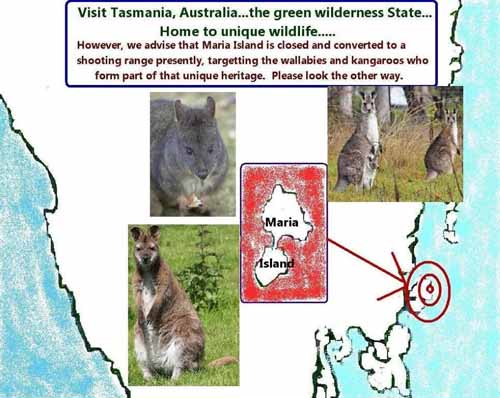
Gay abandon of triple bottom line principles in Tasmania beckoned his departure
Gunn's chairman John Gay abandoned triple bottom line principles for a means to achieve ends strategy.
John Gay's departure was of his own making. He ignored stakeholders - ordinary Tasmanians who value their forests. He labelled them conveniently 'Greens', directed unlimited company resources to try to legally intimidate them.
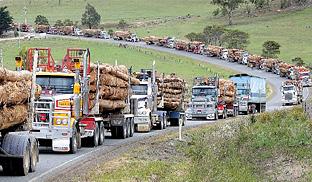
In January 2009, Gunns was distracted suing Tasmanians protesting at its Triabunna woodchip mill trying defend Tasmania's old growth forests.
During the rest of 2009, the GFC and other factors such as its key export markets declining hadn't helped Gunns' share price. On 20th November 2009 Gunns announced its plans to acquire Great Southern. This sent an optimistic signal that Gunns was consistently profitable investor in its 'big player' role in forestry, pulpwood and plywood.
But in December 2009 Gay unloaded 3.4 million shares at an average price of more than 90 cents each. Then in February, Gunns stunned the market when it announced a first-half profit of only $400,000, dramatically below what had been expected.
IMF has commenced a class action against Gunns alleging Gunns has engaged in misleading or deceptive conduct and breached its continuous disclose obligations between August 31 and February 22, 2009.
Now Gay claims it was all the fault the Greens. Sounds like Gay is trying to keep the logger faith, even though many have shares in Gunns.
The collapse of Great Southern and Timbercorp were because they were dodgy tax avoidance schemes caught by the tax office as such. Timbercorp was always a poor investment because it was predicated on promises of misleading gains from tax deductions. Investors were spruiked to borrow to invest on the assumption the interest rate on the borrowings would be offset by after-tax returns. Timbercorp was about profit on false pretenses. It was nothing about long term investment in sustainable forestry plantations. But it has given plantations a bad name.
Great Southern was similarly based upon investors seeking a tax break investing in blue gum plantations on the promise that when the trees grow they will make money and also get a tax break. Poor investment regulation and poor management have also been blamed.
Former Gunns chairman John Gay and former Premier and Gunns board member Robin Gray are leaders of a colonial prejudiced Taswegian culture that has exploited Tasmania at the expense of ecological, social and economic consequences. Such a backward culture deserves to be pulped.

Gunns has not only lost its pulp mill business, it is selling off its original hardware business to Woolworths' owned Danks for $40 million (24th May 2010). Under the agreement, Danks will acquire Becks Timber & Hardware business and five Gunns stores, one timber joinery centre, a truss manufacturing plant and a support office.
Gunn's tyrannical empire is crumbling.
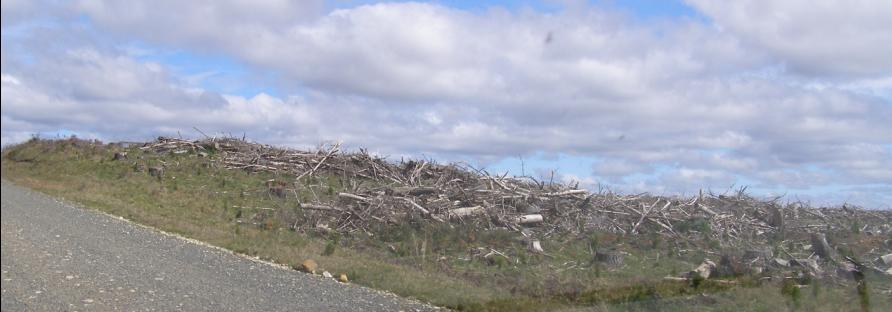
Governments fail to see the value of old growth forests other than for "management"
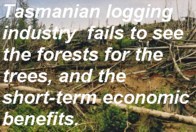
Tasmania's forest industry has rejected a Greens plan to ban logging in high conservation value forests. The Greens says 300 jobs would be lost but more than 700 created through the strategy. Even job creation is not enough to move the die-hard destructive mentality. Both Labor and Liberals support Gunns pulp mill and neither is proposing any new forest reserves.
Trees up to hundreds of years old cannot be replaced overnight, despite how "sustainable" the logging is supposed to be!
Governments fail to see the value of forests when they can't see the trees as anything but resources to plunder, or "manage", for economic benefits and jobs.
Tasmania's forest industry has rejected a Greens plan to ban logging in high conservation value forests. The Greens says 300 jobs would be lost but more than 700 created through the strategy. Even job creation is not enough to move the die-hard destructive mentality. Both Labor and Liberals support Gunns pulp mill and neither is proposing any new forest reserves.
Mr Bartlett signalled that on the hot topic of forestry, Labor wanted to ensure the logging of old-growth forests would continue in the long-term. I believe old-growth will always be part of Tasmania's (forestry) mix.
The manufacture and sale of high value products from special timbers provides employment for more than 2,000 Tasmanians and generates about $70 million for the state each year. The vast majority of wood from these forests (approximately 80%) goes into short lived products such as paper and cardboard which decompose and release carbon very quickly. So, carbon storage in wood products can never make up for the loss of carbon storage in old growth forests.
An alliance of forestry companies in Tasmania has launched an advertising campaign warning of the risks to the economy if all old growth logging is stopped. Forests remain silent inside the consciousness of people who are environmentally illiterate!
Governments fail to see the value of forests when they can't see the trees as anything but resources to plunder, or "manage", for economic benefits and jobs.
Who will publicise the risks to our heritage, our air, water, homeless native wildlife, and additional greenhouse gas emissions when old-growth forests are destroyed? By their very nature, these trees take hundreds of years to replace themselves, yet we, the public, are supposed to be so myopic that the ephemeral financial returns from logging old growth forests should over-ride the value of these ancient sentinels, guarding the wealth of natural ecosystems?
It may appear as if nothing is changing in forests, but countless natural cycles are silently at work every day and night. Old growth forests have a high level of biodiversity, and logging causes disturbances and destruction.
Conserving the nation's forests and woodlands is one the easiest, cheapest and fastest ways that we can start to reduce greenhouse gas emissions and improve carbon storage.
Many of the RFA old growth forests protected in Tasmania consist of trees of little use to the timber industry. Despite repeated requests for solid evidence supporting such ‘statistics’ as “90% of the Upper Florentine Valley is reserved from logging,” data and maps supporting such claims have failed to materialise. We do know, however, that most of the ‘protected’ country in the Upper Florentine consists of buttongrass, scrub and high-altitude moorlands, with very few tall-eucalypt forests reserved. Only 22% of Tasmania’s original tall-eucalypt forests have been reserved.
Tasmania is the largest exporter of woodchips in Australia, exporting more than all the other states combined.
This year, ironically, is the UN Year of Biodiversity, and next year is the Year of Forests.
As our population swells, more natural resources such as forests will be considered as assets to plunder for economic benefits! Our natural heritage, and ecosystems, are continually under threat from industry and developments.
We are already world-leaders in wildlife extermination, and Tasmania is famous for the genocide of its indigenous people, destroying Lake Pedder, exterminating the Tasmanian Tiger and for the current threats to the Tasmanian Devil. Logging native forests destroys homes, creates stress and robs wildlife of habitat. We humans are not part of their ecosystems, and removing trees increases fire risks.
Unless we declare all our old-growth forests and remaining native vegetation as part of our national park system, the logging mafia will continue to threaten, bully and dominate our State governments.
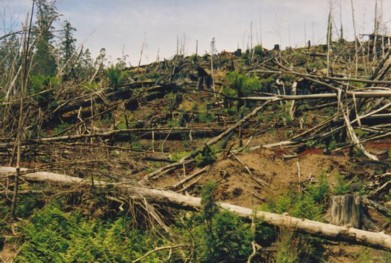
(Photo: devastation at the Styx old growth forests - Wikipedia commons)
A recent poll shows the Labor government of Premier David Bartlett is in trouble, with the Greens polling well. Unless there is a late surge in support for David Bartlett's Labor or Will Hodgman's Liberals, one or other of them will be governing in minority after March 20, ending 12 years of ALP majority rule.
People can relocate, retrain and be resourced in other industries. Trees up to hundreds of years old cannot be replaced overnight, despite how "sustainable" the logging is supposed to be!
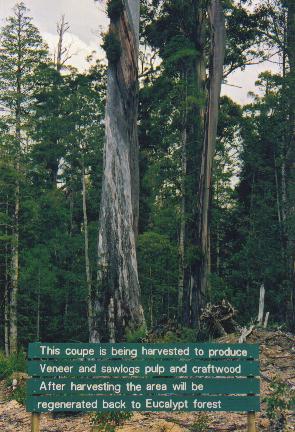
(photo: Styx logging sign)
Our old-growth forests do not owe us, non-indigenous people of Australia, a livelihood. We owe it to next generations a nation with its natural wealth intact and viable through preservation, and honouring our heritage and non-human species.
Endangered Quolls and Flying Foxes fleeing loggers on NSW South Coast
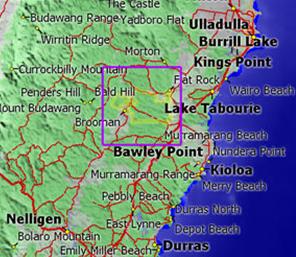 Last Monday week, 1st February 2010, conservationists down the NSW south coast temporarily stopped logging in South Brooman State Forest, situated between Ulladulla and Batemans Bay.
Last Monday week, 1st February 2010, conservationists down the NSW south coast temporarily stopped logging in South Brooman State Forest, situated between Ulladulla and Batemans Bay.
They have called on the NSW Premier, Kristina Keneally, to halt the destruction. Assurances were given by the NSW Government's deforester 'Forests NSW' to the local community that Forests NSW would ensure damage to threatened species habitat is mitigated.
Endangered Grey-headed Flying Foxes in South Brooman Forest
These assurances are signed off in a Regional Forest Agreement (RFA), yet RFA's have become regarded as logger speak for deferred right to log.
The evidence of habitat destruction in logger 'Compartment 62 and 63', that were earmarked for protection by the community, clearly shows the law is not being implemented.
Spotted-tailed Quolls are escaping to nearby private properties as their habitat is being destroyed, which is particularly alarming as Forests NSW pre-logging fauna surveys failed to identify these animals as being present in the area.
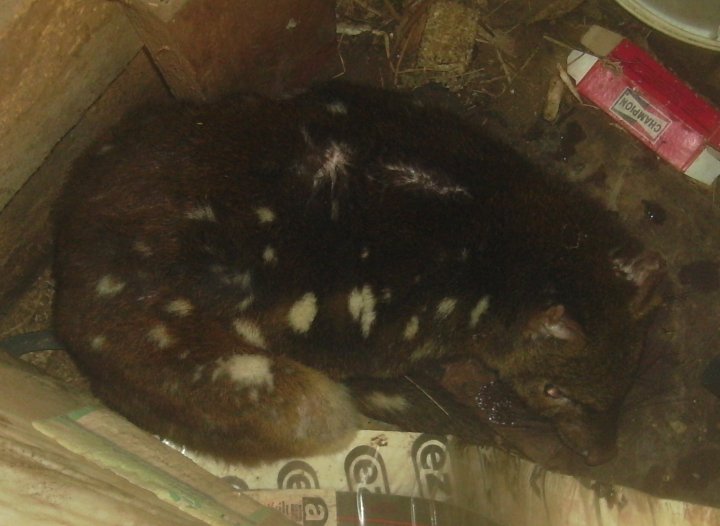
Spotted-tailed Quoll rescued from South Brooman Forest
"Forests NSW are breaching native forest management strategies and wilfully ignoring their own legislated regulations," said Lisa Stone from South East Forest Rescue.
"We are sending a clear message to the NSW and Federal Governments that they must fulfil their international obligations on climate change by protecting their remaining carbon sinks," said Ms Stone. "Forests NSW have fudged the books when it comes to reporting their greenhouse gas emissions. We call on the State and Federal Governments to prove that political will is not extinct and put an end to native forest logging, for us and our children's future."
Neanderthal logger culture in Forests NSW try to justify that many native trees are just too big and mature and so have to be chopped down for their own good, or else because previous logging didn't do good enough job, they're contractors are sent back in to finish it off, or simply the standard crap that logging is good for forest health.
Such a bizarre evil mindset is equivalent to Sr Lanka's President Rajapaksa's genocide of the ethic Tamils last May, whom he finished off quite effectively.
RFAs are no more than a bastard fork tongue instrument - one side used by immoral pollies to spin motherhood environmentalism to the public and 'yes' media, the other side that orders in the heavy artillery for the loggers.
Unlike National Parks which are protected under federal conservation legislation, a 'State Forest' is no more than a timber reserve for loggers to log whenever Forestry NSW says it is ok. A 'State Forest' is logger speak for 'virgins of the vanquished' to rape at will by the 'dogs of logging'.
RFA's may as well stand for Rape Forests Anytime.
And Forests NSW justifies its logging as 'education' to children from kindergarten age to "provide interesting and relevant information about the forest environment, in a stimulating and fun way."
Gunns' exploitative arrogance maintains it will sue anyone to protect its ‘commercial interests’
Last month, 30 January 2010, Tasmania's infamous corporate logger, Gunns Ltd, dropped its multi-million dollar defamation suit against environmental activitists protesting against its immoral pulp mill logging threat to Tasmania's old growth native forests.
On 29th January 2010 in the Victorian Supreme Court, before trial Gunns dropped its libel claim against the remaining 13 Tasmanian environmental activists and agreed to pay cost of $155,088 to the Huon Valley Environment Centre and local activists Adam Burling, Lou Geraghty and Brian Dimmick, who protested against the logging of private land near them.
Gunns company secretary Wayne Chapman justified the decision purely as "a commercial decision to avoid the need for a lengthy and expensive court case" saying the case had cost Gunns $2.8 million thus far in legal fees. [Source: 'Gunns payout ends case' by Andrew Darby, 30-Jan-2010].
Senator Brown said the pay-off to the last four defendants amounted to utter defeat for the company.
Gunns' defamation action was a blatant bullying attempt to silence and bankrupt its critics over Gunns immoral environmental destructon of Tasmania for selfish profit. Gunn's corporate bullying action has been appropriately likened to the unethical McLibel case in London in 1989 in which unethical multinational McDonald's Restaurants threatened to sue more than fifty organizations for libel over bad publicity about food poisoning, unpaid overtime, dodgy recycling claims by McDonalds misleading. The infamous law suit was labelled as Strategic Litigation Against Public Participation.and McDonalds stooped so low as infiltrating London Greenpeace and having sex with its staff to gather evidence.[Source]
"In all, the case probably cost Gunns over $4 million — and a lot of bad publicity. It was here that a key precedent was set: a political precedent."
"The whole case generated plenty of bad publicity for Gunns, it damaged their corporate reputation and worked to reignite the corporate campaigning that had triggered the original suit. Forest conservation groups in Japan, Europe and America began campaigning against Gunns' logging practices and targeting Gunns' customers in those countries, while the pulp mill itself became mired in controversy.
Gunns had little social licence left when the global financial crisis sabotaged early attempts to finance the biggest pulp mill in the southern hemisphere — even their bank, ANZ, agreed with critics of the pulp mill and declined to finance it. Gunns' current preferred partner in the mill, the Swedish pulp and paper company Sodra Ltd, is putting conditions on its involvement which will require Gunns to pursue a new model of engagement with the community. It is unlikely that this new model includes suing environmentalists.
The pressure of bad publicity, the risk to the pulp mill project and a court case with little left in it over a protest which took place seven years ago all combined to force Gunns to pull out of the case on the eve of the trial. Gunns stated that this was a "commercial decision to avoid the need for a lengthy and expensive court case". But it was always going to be a lengthy and expensive court case. The fact that Gunns agreed to pay a substantial sum to the defendants to end the case shows the pressure the corporation was under. It was, as a judge described the dropping of claims earlier in the case, a capitulation.
Gunns are still suing 13 other activists in an unrelated case after a protest at Triabunna woodchip mill in December 2008, but, like the Gunns 20 case, it seems unlikely that this case will ever get to court. Rather than dragging out proceedings unnecessarily — only to make another "commercial decision" — Gunns should take another step toward rebuilding its corporate reputation and settle this case."
"The settlement of the Gunns 20 case was a huge victory for those who support free speech and the protection of Tasmania’s environment. The world needs to know, however, that Gunns continues to sue Tasmanians who oppose their environmental vandalism,” said Gunns 13 spokesperson Warrick Jordan.
“The Gunns 13 are still being sued. While Gunns continue to sue ordinary Tasmanians, and continues to destroy High Conservation Value forests, their hopes of being seen globally as a good corporate citizen are a hollow fantasy.”[Source: Greg Ogle, 5-Feb-10, New Matilda]
For a synopsis of the case visit The Friends of Forests and Free Speech
If Gunns desires to earn the right to be an Australian corporate citizen and continue trading in Australia, itt needs to rethink its arrogant attitude and comply with Australian civil, moral and environmental standards. Else its bullying will drive its Neanderthal narrow thinking into extinction. Then so like the demise of the cannibals in the film 'Van Diemens Land, this would be a good thing for Tasmania.
Tasmania, West Australia, Victoria - our wildlife are ignored by government
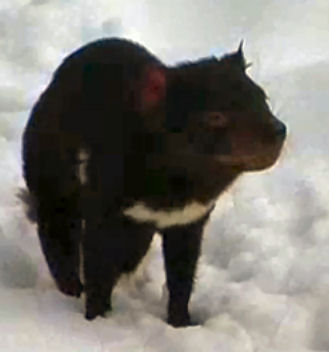
Photos of Tasmanian Devils are from this wonderful you-tube movie by Chris Coupland of a devil in the snow at Cradle Mountain. (The music may not be to everyone's taste but it suits the devil's walk.) Note that Tasmania's devils are so inbred due to isolation that somewhere round half now suffer from a fatal mouth cancer. For this reason vigilance must be of highest order.
Fauna protection in every state is a disaster!
Victoria isn't the only state that has received terrible criticism of their administering of fauna protection laws.
You only have to google for Auditor Generals' reports on fauna to come up with them for most or all states in Australia. Here are some examples:
Tasmanian Government
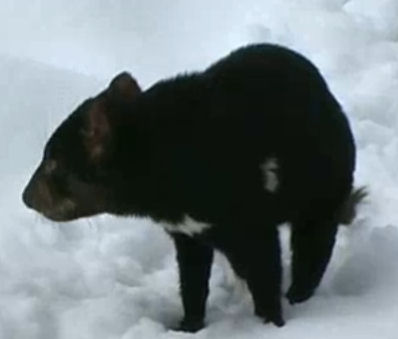
Threatened Species Report, Auditor-General of Australia, March 2009
http://www.audit.tas.gov.au/publications/reports/specialreport/pdfs/specialreport78.pdf
A damning report on the state of Tasmania's rare and endangered species by Australia's Auditor-General, was released in March, 2009 and among may issues notes how only 2 of Tasmania's threatened species have full recovery plans in place.
Tasmania's Southern Forests are habitat-in-crisis for many of these species. 
“It was pleasing to find evidence that private forest covenants had been numericallyeffective but that only two public authority management agreements, which provide an effective mechanism to allow public sector entities to commit to arrangements for management of species and habitats, had been made.
Another concern was that the existing organisational structure did not encourage a strategic approach to conservation of threatened species, their habitats and the threatsconfronting them. However, a divisional plan with clearly defined objectives exists and performance against the plan was regularly monitored and results published.
The Report includes 19 recommendations primarily aimed at introducing a structuredand prioritised approach to managing Tasmania’s threatened species with a focus on assessing implementation plans and monitoring progress.”
West Australian Government
West Australia:
10 June 2009
Auditor General finds number of threatened species increasing and few are improving (West Australia)
With WA’s list of threatened species now over 600 and rising, Auditor General Colin Murphy has found that recovery action is not happening for most, and few are improving.
In his report tabled in Parliament today titled, Rich and Rare: Conservation of Threatened Species, Mr Murphy found that, in many areas, the Department of Environment and Conservation (DEC) is not providing effective protection and recovery to WA’s threatened flora and fauna.
“Only a handful of threatened species are actually recovering, while the number of species on the list continues to grow,” Mr Murphy said.
“My office has found that only one in five threatened fauna, and fewer than half of threatened flora species have recovery plans, and those plans that are in place are often not fully implemented.”
The report also found that DEC’s $8.2 million threatened species program prioritises recovery plans and actions towards critically endangered species, leaving vulnerable and endangered species at increased risk of decline.
A major obstacle to DEC’s performance is the long delay in drafting a Biodiversity Conservation Act, to replace the existing Wildlife Conservation Act 1950. DEC has pursued updated legislation for over 20 years.
The current legislation restricts DEC’s ability to effectively conserve threatened species; existing protection measures are largely inadequate, and DEC does not have the power to access threatened species on private property to implement much-needed conservation action.
The report found that multi-species approaches to conservation can be effective in dealing with the growing number of threatened species.
“DEC is undertaking a number of multi-species approaches. For example, the Western Shield program has improved the status of several native mammals,” Mr Murphy said.
“DEC is also acquiring land to secure species habitat, but less than half the nationally agreed target has been reserved in WA.”
The Auditor General’s report found a number of other areas for improvement, particularly:
* DEC cannot demonstrate that all of its threatened species conservation activities are effective.
* DEC has not identified habitat critical to the survival of all threatened species.
* State and Commonwealth threatened species lists are not aligned and 190 WA species do not receive protection from the Commonwealth Government.
“Increasing numbers of threatened species and the size of WA present a significant challenge for DEC,” Mr Murphy said.
“Achieving the right balance between programs which benefit large numbers of species at once, with those targeted at individual species’ needs, will be critical.”
Forestry has transformed most of Sweden’s forests into plantations and young forests.

Forestry Minister Tony Burke and Premier Bartlett may be rejoicing that Gunns has a joint venture partner, the Swedish company Sodra, for Tasmania's pulp mill. It would be "good" for jobs and for the Tasmanian economy!
Swedish company Södra stated that it would only be involved in a pulp mill in Australia if it was Forest Stewardship Council (FSC) certified, totally chlorine-free (TCF) and 100% plantation-based.
So-called "sustainable" forestry has perpetuated the myth that primary and old growth forests can and should be harvested using "Sustainable Forest Management" (SFM) techniques.
However, forestry has transformed most of Sweden’s forests into plantations and young forests. Sweden's forestry corporations are quickly turning a once a beautiful land of old-growth forests full of life and diversity into clearcuts. Nearly all Sweden's virgin forests are gone. What is left is the old growth forests, and those are being erased now.

Over 1,800 animal and plant species in the Swedish forests are red-listed and many of them are dependent on old trees, dead wood and old-growth forests deciduous trees to survive. This is despite Sweden's example of "good" and "sustainable" forestry industries!
Gunns will still have to pass the final stage of an assessment by the Environment Minister, Peter Garrett, before the mill can operate, but is allowed to begin construction of the project!
Could this be the price that Tasmanians, and Australians, are willing to pay for what is "good" for jobs and the economy?
Gunns woodchip mills drastically downsize production
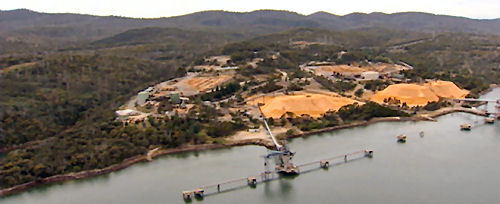
A Gunns' woodchip mill at Longreach in Tasmania
Is the final nail in the coffin for the proposed Gunn’s Tasmanian pulp-mill an economic one?
Tasmanian mills are closing down left, right and centre.
In
“Gunns shuts chip mills”, The MercuryFeb 20, 2009, Nick Clark reports,
“The Long Reach mill will shutdown next week and every Friday until the end of April. The Triabunna mill is closed from midnight tonight until March 9. After that it is closed for a series of Fridays as well as the week of April 10-17. The Hampshire mill at Burnie has had an additional week shutdown added next week and a four day week until the end of April. Tasmania Forest Contractors Association chairman Rodney Bishop said some contractors were carrying as little as 40 per cent of their normal quota.”
Japan doesn't want woodchips now due to the downturn and dropping paper and packaging sales. But, the Japanese company, Nippon, has just bought the Latrobe Valley's Paperlinx factory. It seems like a very risky purchase - even if they got it dirt cheap.
A Buyer’s market or a Fire-sale?
Or is this the same buyer’s market that sees the Chinese making offers for Australian mines, caught in the downturn after overly leveraging on projected growth?
Australians should keep our opportunistic government and Foreign Investment Review Board vigilant not to give in to a fire-sale here. Closing down these unviable industries is what should happen. It should have happened in the 1860s. Let’s encourage these refractory industries to invest in the health of forests by leaving them alone.
Ominous move on Victoria’s protected water catchments
Paperlinx at Maryvale lost a huge chunk of it's 'resource' (trees) in the Victorian bush-fires. At the same time there has been a renewed push by the logging lobbyists to get into Melbourne's catchments, which have been closed to them up until now.
The move to get into our last few protected water catchments is ominous and should not be granted by government.
Victorians should be vigilant about any claims by the logging industry that they are performing a social service of salvage logging and making these areas more accessible for fire trucks.
No fire-sales please
We already know that the worst hit areas in the fires were the logged and wood-chipped ones. On that basis, to let the loggers in to relatively intact forest would be tantamount to increasing Victoria’s fire danger.
Keep an eye on this one and scream loud and long if you get the chance.
Gunns in trouble: Economic crash may leave forests standing; flatten wood-chip industry
Illustration by Gustave Doré for of Jean de la Fontaine's fable of La Mort et le bûcheron
Wood-chip prices way down
On Saturday, February 21, 2009, the Daily Timber News announced a significant down-turn in the wood-chip industry. Defenders of biodiverse old-growth forests are watching closely as events unfold. It is of course not pleasant for people employed in the industry.
Apparently the Japanese pulp industry, up to now faithful through thick and thin, is losing its appetite for pulp. Last year (2008) Australia supplied Japan with the most hardwood chips (36%) in a year when Japan imported “a record 12.3 million BDMT's of hardwood chips”, according to the Daily Timber News.
Surprisingly, the Daily Timber News links the fall in wood-chip imports to the fall in production of “cars, machine tools, electronic goods and mobile phones.”
How so?
Well, all these products “require thick paper manuals,” the report explains.
A number of Japanese pulp mills have substantially interrupted their production. New technology may also be a factor, and the recycling of fibers. [Ed. Does this refer to wood-fiber or something more durable, since wood-fibers are short and recycle poorly?]
Demand may also fall dramatically from China. The industry was anticipating strong growth there because of plans to build more pulp mills and increase capacity in those already built, but these plans are now on hold.
Where to now?
People concerned about the destruction of forests are hopeful that the industry may give up on wood-chipping now. There is a conference coming up which will look at “investigating the possibility of timber concerns investing in the carbon-offsetting trading,” in the light of these declining trends in softwood and hardwood woodchip trading.
The woodchip industry is now facing a huge drop in prices for its chips. It has always operated at a net financial cost to Australians, many of whom have wondered why on earth it has continued for so long. Will the State governments that have for so long protected the woodchip industry try to make Australians pay even more to keep it going? Seasoned conservationists are probably waiting until the fat lady sings.
About the illustration
The illustration by Gustave Doré for of Jean de la Fontaine's 17th century fable of La Mort et le bûcheron (Death and the Woodcutter) might be peculiarly apt. The poem is about an ancient woodchopper, bent over under a huge burden of wood. He is on his way home to his filthy hut and every step is agony; not only from the weight of the wood on his back, but from the weight of his years. Overwhelmed by his problems, he drops his load of wood on the ground and contemplates his sorry predicament. Unable to pay taxes, he must harbour soldiers; he often cannot afford a loaf of bread; he must toil endlessly for his wife and children; he cannot remember any happiness since he came into the world. He decides to call Death for a final solution to his problems. Death comes as soon as She is called, and asks, "What do you need me to do?"
At this question, surprisingly, the Woodcutter says, "I want you to help me lift up this load of wood and get it on my back again. Don't worry, I won't keep you here long."
The moral of this poem is that humans usually prefer to go on doing the same thing, despite the suffering it causes them, than to change. One would hope this were not so for the woodchipping industry.
La Mort et le bûcheron
Un pauvre Bûcheron tout couvert de ramée,
Sous le faix du fagot aussi bien que des ans
Gémissant et courbé marchait à pas pesants,
Et tâchait de gagner sa chaumine enfumée.
Enfin, n'en pouvant plus d'effort et de douleur,
Il met bas son fagot, il songe à son malheur.
Quel plaisir a-t-il eu depuis qu'il est au monde ?
En est-il un plus pauvre en la machine ronde ?
Point de pain quelquefois, et jamais de repos.
Sa femme, ses enfants, les soldats, les impôts,
Le créancier, et la corvée
Lui font d'un malheureux la peinture achevée.
Il appelle la mort, elle vient sans tarder,
Lui demande ce qu'il faut faire
C'est, dit-il, afin de m'aider
A recharger ce bois ; tu ne tarderas guère.
Le trépas vient tout guérir ;
Mais ne bougeons d'où nous sommes.
Plutôt souffrir que mourir,
C'est la devise des hommes.
FOREST/CLIMATE ALERT! Final push needed to save Tasmania's ancient forests from woodchippers
FOREST/CLIMATE ALERT! Final Push Needed to Stop Australia's Tasmanian Ancient Forest Pulping for Throw-Away Paper Consumption

(Image is Piguenid's 's painting of the Tasmania Grose Valley - circa 1887)
Gunns of Australia's controversial plans to build a huge pulp mill to make disposable consumer items largely from clearfelling ancient forests is close to failing, let us together make a final decisive push to warn off potential investors and environmental approvals and achieve its permanent withdrawal.
 Plans by Australian woodchip giant Gunns Ltd., to continue clearcutting of Tasmania's ancient forests to feed a massive new paper pulp mill, appear to be near final collapse. Gunns is scrambling to raise the cash needed to build the AU$2 billion pulp mill and to meet a looming federal government environmental approval deadline. Chief executive of Leighton Holdings, the proposed builder of the mill, has even stated the project is dead. Join us in supporting massive local protests, and calling upon Australia's Federal Environment Minister Peter Garrett to not extend the environmental approval process, and for the several European pulp interests to steer clear of funding the project or risk years of protest and conflict. Let's join together with local protests and ensure the Gunns pulp mill proposal is permanently withdrawn from consideration.
Plans by Australian woodchip giant Gunns Ltd., to continue clearcutting of Tasmania's ancient forests to feed a massive new paper pulp mill, appear to be near final collapse. Gunns is scrambling to raise the cash needed to build the AU$2 billion pulp mill and to meet a looming federal government environmental approval deadline. Chief executive of Leighton Holdings, the proposed builder of the mill, has even stated the project is dead. Join us in supporting massive local protests, and calling upon Australia's Federal Environment Minister Peter Garrett to not extend the environmental approval process, and for the several European pulp interests to steer clear of funding the project or risk years of protest and conflict. Let's join together with local protests and ensure the Gunns pulp mill proposal is permanently withdrawn from consideration.
Take action now, Discuss this alert.
By Ecological Internet's Climate Ark (www.climateark.org),
and Forest Protection Portal (forests.org),
Originally published at http://www.climateark.org/shared/alerts/send.aspx?id=australia_tasmania_climate
30 August 2008
See also: Wielangta Forest is about to be logged to make paper in Japan.
Wielangta Forest is about to be logged to make paper in Japan
Is Garrett a dud? CSIRO pulp mill report on Gunns and other disappointments
(pulp mill effluent image on front page is from http://www.surfrider.org/srui.aspx?uiq=a-z/pulp_mills)
Population numbers
Decidedly, the Federal Environment Minister, Peter Garrett, is proving a substantial disappointment on some major environmental group concerns. As President of the Australian Conservation Foundation he infuriated Australians who were concerned about too much population growth in this country by heading an organisation which refused to voice their concerns and failed to uphold its own constitutional policy on population, but would act as if it was representing the Australian public and ACF constitutional values in this matter.
RAMSAR Wetlands
Since becoming Environment Minister, Garrett has outraged the Blue Wedges, a substantial environmental movement in Victoria, centred around the health of Port Phillip Bay because of what they see as his abject failure to protect the bay, including its RAMSAR wetlands areas, and his failure to meet his obligations under the Environment Protection and Biodiversity Conservation Act 1999 (EPBC) Act to consider sustainability principles – including intergenerational equity.
Intergenerational Equity
"How," asks Blue Wedges, "can it be equitable to future generations of humans - and all other species for that matter- to leave a legacy of a toxic dump in the Bay, 60 times larger than the Hattah Nowingi site near Mildura? It is worth remembering that in 2006, the Mildura site was rejected, first by the community and then by an independent planning panel."
EPBC Act
Australian wildlife campaigners had hoped that Garrett in government would intervene to make the EPBC Act more effective. Instead he has relied upon its inherent weaknesses to support more development in and destruction of important environments around Australia. Environmentalists, many who elected him, have found his performance bitterly disappointing. (The Act had never been very strong but had been further watered-down by the Howard Government in 2006 amendments.)
Murray Darling Basin
And his failure to intervene in the Murray Darling Basin South Australia crisis has provoked disgust. Here, as with Port Phillip Bay, RAMSAR wetlands and fragile marine ecosystems are threatened.
The Arts
Yesterday, The Age reported that Garrett, as Minister for the Arts has let down the arts community badly, defending the Rudd Government’s 3.25% funding cut to small public sector agencies, such as the National Gallery of Australia, National Library of Australia and the Australian War Memorial. See: http://news.theage.com.au/national/cultural-institutions-get-enough-money-20080825-41xf.html
Broad agreement that Garrett is a dud
In short there is broad agreement that Garrett is a dud – although calling someone a dud is likely to have one ejected for the House of Representatives (ABC PM tonight – 26-8-08) …..It seems even parliamentary privilege is no protection for robust criticism any more - So much for freedom of speech in this fair land!
Green Senator denied CSIRO research report on Gunns Pulp Mill
On the 21st of August, Senator Christine Milne strongly criticized Garrett’s failure to supply her Freedom of Information request for a CSIRO research report from a member of an independent expert group which has the task of reviewing material submitted by Gunns pulp mill.
Query about pulp mill effluent dumping
According to her press release of 21-8-08, Senator Milne believes that the report relates to “Gunns’ intention to dump 64,000 tonnes of effluent into Bass Strait per day and the probabilities of it exceeding the allowable effluent concentration.”
Garrett's department mired in process?
On 22 August, Garrett, in an ABC Radio National Breakfast interview with Fran Kelly Garrett seemed basically to be saying that his department would not release the report Milne was complaining about because the material in it had not been verified and because there was a process whereby Gunns could be asked to supply more information to clarify the material in the report. One wonders if Garrett was being circumspect because of the possibility that Gunns (famous for having pursued 16 individuals - including Green MPs Bob Brown and Peg Putt - and four green organisations - including the Wilderness Society - for a total $6.3 million damages arising out of protests and campaigns against the company) could sue for defamation if a report led to financial losses and could be shown to be knowingly premature or incomplete.
Senator Milne seems to be indicating in her complaints, that she believes that the report must already be adequately informed.
Deadline for Gunns
In the interview with Fran Kelly of the ABC it was made clear by Garrett that Gunns has until October 4, 2008, to finalise its input into the Government's assessment process. It sounded like Garrett might well give Gunns more time if it requested this.
Both Senator Milne, in her 21 August press release, and Fran Kelly in her 22 August interview with Garrett, described Gunns' as if they were in severe financial difficulty and as if the question of the amount of discharge they might be contemplating was the focus of much speculation in the business community.
Senator Milne: “With Gunns stock in freefall, and rife speculation in the investment community as to the content of scientific studies, this is not the time for the Government to prioritise Gunns’ commercial interest over the public interest."
Fran Kelly: "Yesterday, shares in Gunns were at an eight year low, in fact placed in a trading halt while the company goes out seeking this funding. In the last few weeks doubts have been raised about the future of the pulp mill. Leighton Holdings boss, Wal King, says it will never be built and there are some reports that even the new Tasmanian Premier, David Bartlett is sceptical."
This kind of comment about Gunn's financial situation should, one would think, tend to alleviate any anxiety Mr Garrett might have about the possibility of defamatorily prejudicing Gunns' business outlook by the release of more information.
Milne: Since when does an environment minister protect the interests of big business over those of the public?
Garrett's close-lipped approach on this matter does seem to lend weight to the relevance of Senator Milne's question:
“Since when has the Commonwealth Environment Minister seen himself as the protector of the interests of big business at the expense of the environment and the public interest?"
Changes to defamation laws
For many years it was extremely difficult for the Australian press to report clearly on financial matters because of Australia's defamation laws, which did not support truth in reporting and which could lead to extraordinary costs in court. In those days, even if what you said about a company was true, if that company lost money over your revelation, you might lose any case they brought against you for defamation. This problem is well treated at the end of Trevor Sykes, The Bold Riders, Allen and Unwin, Australia, 1996, for anyone who would like to know more. (Trevor Sykes writes for the Financial Review as Pierpoint.)
Since 2006 these state laws have been largely harmonised and made much more reasonable, with truth a very strong defense and the public interest a non-qualifier or at most a minor qualifier. There are also limitations on costs and processes (articulated or implied through precedent) to increase motivation to mediate rather than to sue. The very unpopular Howard Government immigration minister, Philip Rudd, was responsible for placing pressure to free up these laws in favour of public expression.
Article written by Sheila Newman with Jenny Warfe





Recent comments